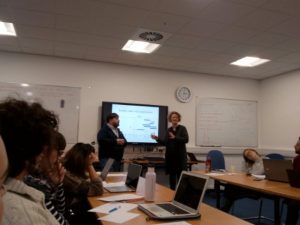On Feb 6th Ullrika Sahlin and Scott Ferson debated two alternative ways to quantify epistemic uncertainty in scientific assessments – precise and bounded probability. In simple terms, subjective precise probability is the measure for epistemic uncertainty in classical Bayesian inference, while subjective bounded (imprecise, approximative) probability is a measure for epistemic uncertainty in a generalisation of Bayesian infernce allowing for sets of probabilities. The generalisation of Bayesian inference is sometimes called Robust Bayesian inference. Bounds on probability can be derived in other ways as well.
Professor Scott Ferson have a lot of experience in using precise and bounded probability. He is also a well known workshopier.
Scott and Ullrika had a discussion/battle for students at the Institute for Risk and Uncertainty Centre for Doctoral Training – University of Liverpool. The quantification of epistemic uncertainty by precise or bounded probability was approached by challenge problems. Solutions to these will be published in due time.
As the writer of this post, I, Ullrika, give my view on this. I think that precise probability is sometimes disregarded as a measure for epistemic uncertainty for wrong reasons or could be done better. I am often unsure of how the quantification of bounded probability is done in assessments. Propagation of bounded probability is sometimes faster than a 2-dimensional Monte Carlo simulation (separating aleatory and epistemic uncertainty), and provide conservative ouptut which can be used in a tiered risk assessment.
With a background in Bayesian inference, I am open for embrasing the bounded probability as a measure for epistemic uncertainty, which can be useful in situations when the assessors judge precise probability as not enough to fully characterise epistemic uncertainty. By comparing these two measures for epistemic uncertainty we can strenghten the understanding of them and in a longer perspective the quantification of uncertainty in scientific assessments.

